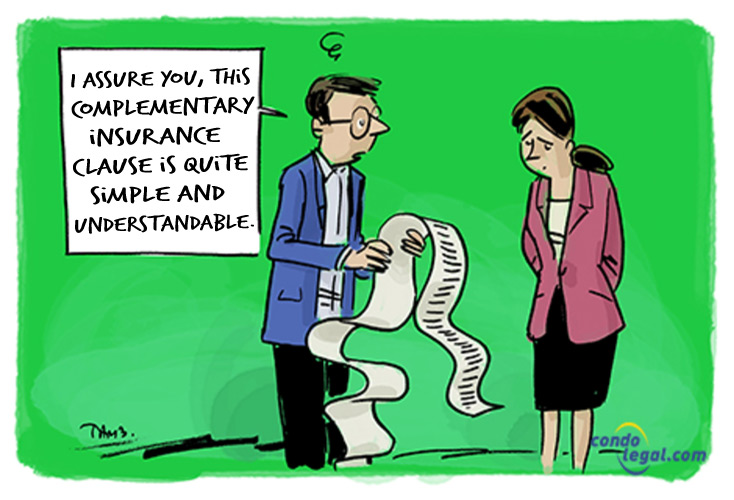 Most declarations of co-ownership compel you, as a co-owner, to take out and maintain in force civil liability insurance and insurance for your movable property and the improvements to your private portion.
Most declarations of co-ownership compel you, as a co-owner, to take out and maintain in force civil liability insurance and insurance for your movable property and the improvements to your private portion.
But beyond these often mandatory insurance coverage, you can also purchase optional complementary insurance. Be aware that this insurance product does not cover all risks.
Here are some scenarios under which complementary insurance coverage could be of great assistance.
Undervalued Immovable
Failing insuring the immovable for its replacement value, in case of a loss the insurance indemnity may be insufficient to repair or rebuild. Some boards, particularly in small co-ownerships, tend to underestimate (intentionally or unintentionally) the costs of reconstruction of the immovable. They do so out of ignorance or to pay cheaper insurance premiums.
Such a turn of event would be detrimental to the co-owners. And rightly so, since in the event of a loss, this insufficiency of insurance would force the syndicate to cover the shortfall between the indemnities paid out and the required funds. This would be funded by a drawing from the working capital of the syndicate, or by a special assessment (a call for contribution for expenses).
High deductible
Due to recurring losses (e.g. Water damage), some syndicates of co-owners are being imposed franchises of up to $ 25,000, $ 50,000 or even $ 100,000. If the damage caused by the loss is assessed below the amounts here above, no indemnity will be paid by the insurer. Furthermore, if the damage exceeds the said amounts, the deductible will be subtracted from the indemnity to be paid. In both cases, this could result in a special assessment to the co-owners.
Some risks can be totally excluded from the syndicate’s insurance policy. For example, an insurer might decide to cease covering events of water damage because of the excessive reoccurrence of this type of loss. In this case, the owners could be required to pay for the damages with their own funds.
Limitation of coverage
Insurers may also impose limitations for certain types of coverage, such as sewer backups. Several syndicates tend to underestimate the cost of a sewer backup. By themselves, the demolition and decontamination costs can use up a substantial portion of the compensation paid, leaving only crumbs for rebuilding. In the event an insurer pays $ 50,000 for this type of loss, while damages are in excess of $ 100,000, the owners could be forced to pay the difference.
Plan ahead
To summarize, if (as a co-owner) you had the brilliant idea to take out complementary coverage for the insufficiency or inexistence of the syndicate’s insurance, the amounts that may be claimed from you (following a special assessment) may be refunded in whole or in part by your insurer.
Amounts of the coverage
The limitation of coverage for insufficiency and/or absence of insurance of the syndicate generally take into account the amount of insurance coverage for your personal movable property (e.g. four times the maximum amount the insurer would pay for your personal property, and this, for the same loss). However, given that the complementary coverage offered by insurers are not all identical, it is in your best interest to understand fully the terms and conditions of your policy.
 WHAT YOU SHOULD KNOW! Every insurance policy has limitations and exclusions.Your damage insurance representative must explain them to you, because it is his duty to do so as an expert-consultant in such matters.
WHAT YOU SHOULD KNOW! Every insurance policy has limitations and exclusions.Your damage insurance representative must explain them to you, because it is his duty to do so as an expert-consultant in such matters.
 WHAT TO KEEP IN MIND: When the insurance coverage taken out by your syndicate is not sufficient, it must generally proceed to a special assessment (special contribution). If you purchased additional coverage for the insufficiency and/or absence of insurance of the syndicate, your own insurance company may reimburse you, in whole or in part, the amount you would have otherwise paid in the form of a special assessment.
WHAT TO KEEP IN MIND: When the insurance coverage taken out by your syndicate is not sufficient, it must generally proceed to a special assessment (special contribution). If you purchased additional coverage for the insufficiency and/or absence of insurance of the syndicate, your own insurance company may reimburse you, in whole or in part, the amount you would have otherwise paid in the form of a special assessment.
 WARNING! If your syndicate has insured the building only for half the cost of reconstruction, you are at risk (as a co-owner) of dire consequences. In case of a loss, the insurer will apply the proportional rule, so that it would pay only half the amount required to restore or rebuild the common or private portions. That is why, as a co-owner, it is in your own best interest to take out insurance coverage to protect you against the negligence of your syndicate.
WARNING! If your syndicate has insured the building only for half the cost of reconstruction, you are at risk (as a co-owner) of dire consequences. In case of a loss, the insurer will apply the proportional rule, so that it would pay only half the amount required to restore or rebuild the common or private portions. That is why, as a co-owner, it is in your own best interest to take out insurance coverage to protect you against the negligence of your syndicate.
![]() CONSULT THE PUBLICATION: Condo Insurance: Everything you should know at pages 99 and following.
CONSULT THE PUBLICATION: Condo Insurance: Everything you should know at pages 99 and following.
